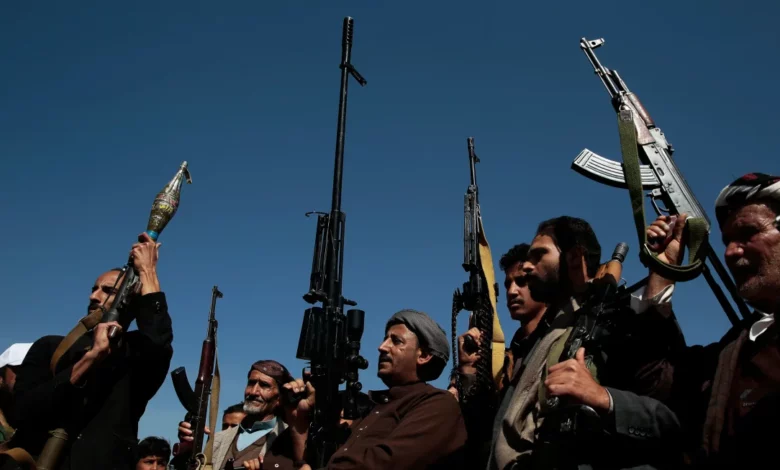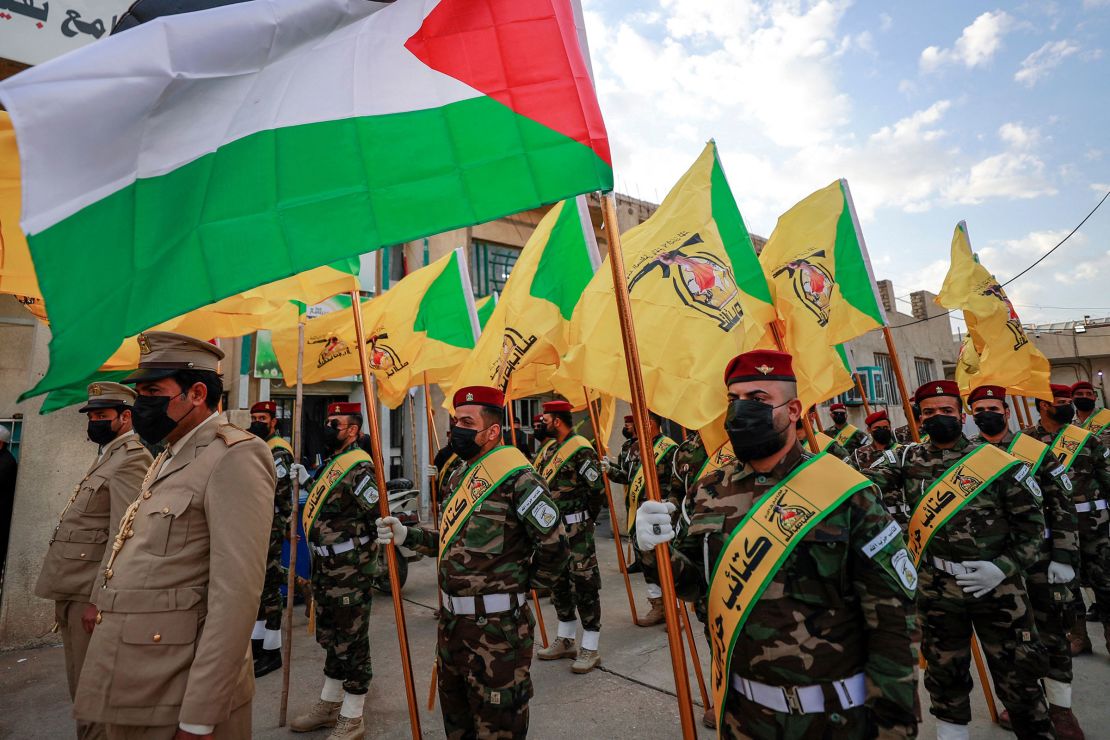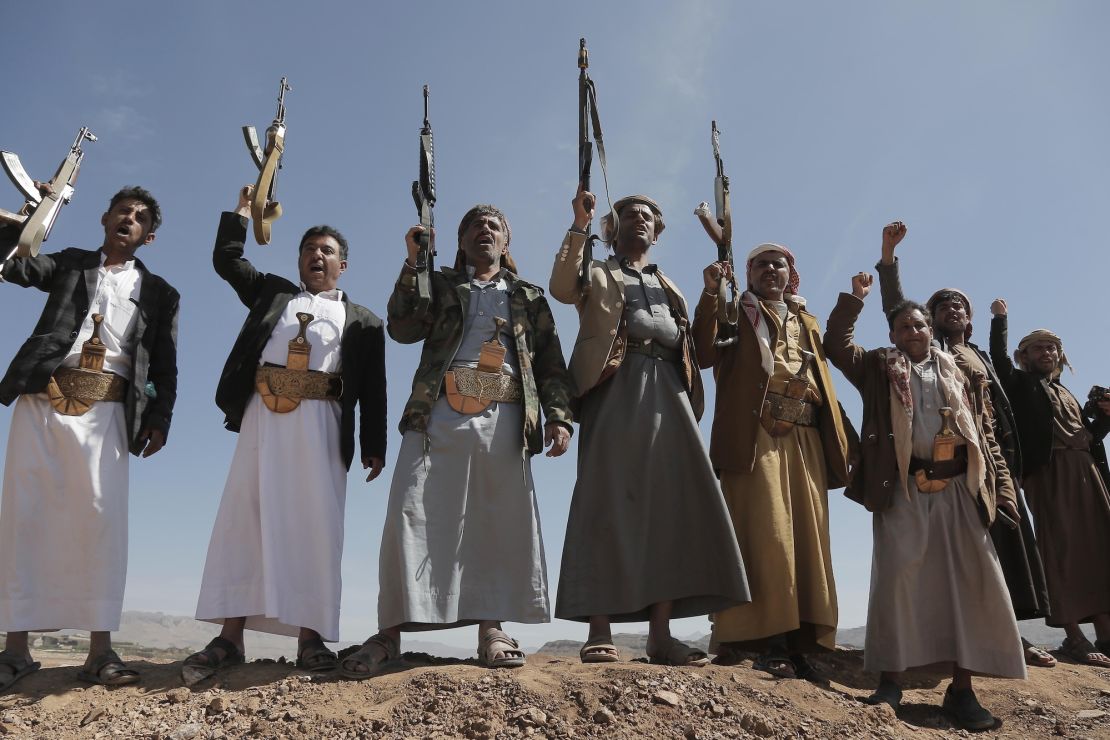
US officials believe there are signs that Iranian leadership is nervous about some of the actions of its proxy groups in Iraq, Syria and Yemen, according to multiple people familiar with US intelligence, as attacks from militia groups threaten to disrupt the global economy and significantly up the risk of direct confrontation with the United States.
The drone attack that killed three American soldiers at a US outpost in Jordan, which the US has attributed to the Iran-backed umbrella group Islamic Resistance in Iraq, caught Tehran by surprise and worried political leadership there, officials told CNN, citing US intelligence.
Iran-backed militants have launched over 160 attacks on US forces since October. And while Iran has long funded, equipped, and trained its proxy militias in the region with the goal of attacking Americans, the strike from this past weekend was the first to kill US service members since the near daily assaults began four months ago.
US intelligence also suggests that Iran is concerned that attacks from Huthi militants in Yemen on commercial shipping in the Red Sea could upset the economic interests of both China and India, key Iranian allies.
Officials cautioned that there is no sense that Tehran’s growing wariness is likely to change its broader strategy of supporting proxy attacks on US and Western targets — although it could signal adjustments around the margins. But officials do believe that Iran is pursuing a calibrated approach to the conflict that is designed to avoid sparking all-out war.
Officials declined to provide further detail on the intelligence, citing its sensitivity. But the US has traditionally been able to obtain intelligence on Iran through a variety of methods including recruiting human spies and eavesdropping on Iranian communications.
The Biden administration is weighing options for how to respond to the recent attack in Jordan, which could involve strikes on Iranian assets in the region — but striking inside Iran itself is highly unlikely, officials said, since the US is not seeking a direct war with Iran, the White House has said.
‘Victims of their own success’
On Tuesday, the Iraq-based proxy militia Kataib Hezbollah announced it is suspending all attacks on US forces, a potential attempt to de-escalate.
But some current and former US officials are skeptical that Iran will substantively change its tactics. One US military official based in the Middle East said that Iran is “quite happy with how things are going.”
“The Iranian regime has been emboldened by the [Gaza] crisis and seems ready to fight to its last regional proxy,” CIA Director Bill Burns wrote in an essay published in Foreign Affairs on Tuesday.
Norm Roule, a former senior Iran analyst for the CIA, said that a primary goal for Iran is to “inject uncertainty and indecision into US policymaker deliberations as to how hard we should strike Iran,” knowing that there are “voices in the US and Europe who will seize any opportunity for diplomacy, even if there is little evidence this will succeed.”
But, Roule said, “I see absolutely nothing — nothing — that in my mind that would compel the Iranian government to change what it’s doing.”

Jonathan Lord, the director of the Middle East Security program at the Center for a New American Security, said, however, that the Kataib Hezbollah statement reflects how the anticipation of a US response has appeared to cause Tehran to pull back, “at least momentarily.”
“I think it’s interesting that just the anticipation of a potentially escalated US response has already had a deterrent effect on Iran’s premier proxy force, without the US firing a shot,” Lord said. He noted that the attack in Jordan appeared to have undermined Iran’s approach since October, which has been to escalate only enough to prevent putting the US or Israel “in a corner” and forced to respond forcefully.
“They were victims of their own success, potentially,” Lord said of the attack in Jordan. “While the attack was similar to the 150+ before it, the results were more deadly.”
Blow back from Red Sea attacks
Meanwhile, there are also indications that Iranian leaders are concerned that the indiscriminate attacks on Red Sea shipping by the Huthis could blow back on Tehran. The Huthis have targeted US Navy ships, risking escalation, and the attacks have caused global economic damage.
India has been particularly impacted as the Huthis have attacked several ships either with Indian crews or heading toward India. In response, the Indian government has deployed several warships to the Arabian Sea.
Two Chinese state-owned shipping giants have also had to divert dozens of ships from the Red Sea to a much longer route around the southern tip of Africa, adding to shipping costs. Beijing raised concerns about the situation on Tuesday, calling for an end to the attacks on civilian ships.
“We are definitively seeing growing signs of concern from Tehran with the lack of specificity in the Huthi targeting,” said one US official. “The diversion of all maritime trade through [the Red Sea] is causing potential blowback on Iran from countries that would have otherwise probably not cared about Israeli and US shipping having to divert.”
The Americans’ deaths, combined with the ongoing shipping attacks, may have now brought the US and Iran closer to the brink than either country wanted.
Iran’s Islamic Revolutionary Guard Corps chief (IRGC) Hossein Salami said on Wednesday that Iran is “not in pursuit of war, but we are not afraid of war.”
“Sometimes enemies make threats and these days we hear some threats from the words of American officials, and we tell them … you have tested us, and we know each other, we will not let any threat go unanswered’,” Salami said.
‘Varying degress of loyalty’
The escalations also underscore the varying degrees of control that Iran actually has over its proxy groups.
“All indications are that Iran has no interest in getting into an escalatory cycle with the United States and Israel,” said one person familiar with the intelligence. While Iran recognizes that supporting its proxies is worth it to keep the West occupied and project power, this person said, the proxies also have their own “parochial interests.”
“They have widely varying degrees of loyalty/fealty to Iran,” this person added.
Among the groups, Iran has the least amount of operational control over the Huthis in Yemen, multiple officials told CNN.
Iran has much more influence over the interlocking web of proxy militias operating inside Iraq and Syria, officials said, and those groups’ activity is often seen by intelligence and military officials as a more accurate barometer of Iranian policy.

The Iranians have provided some intelligence support and weaponry to the Huthis in recent months, including monitoring systems that allow the group to operate in the maritime space and help to facilitate their attacks in the Red Sea. Two US Navy SEALs died earlier this month after falling overboard while trying to interdict a vessel near Somalia that US Central Command said was carrying Iranian-made ballistic missile and cruise missile components to Huthi-controlled Yemen.
Broadly, however, officials said Iran has been apprehensive about the Huthis’ strategy to indiscriminately target vessels transiting the Red Sea, which the Huthis say is in protest of the US and British support for Israel’s war in Gaza.
The US has sought to exploit these anxieties by piling international pressure on Tehran, officials said, including through a UN Security Council resolution and several multilateral joint statements with a range of allies condemning the Huthi attacks and highlighting their ties to Iran.
The US has also urged China to use its influence with Iran to try to ease tensions. In meetings with Chinese Foreign Minister Wang Yi in Bangkok last weekend, US national security adviser Jake Sullivan asked Beijing to use its “substantial leverage with Iran” to stop the attacks, a senior White House official told reporters Saturday.
“This is not the first time we’ve called on China to play a constructive role,” the official said. “Beijing says they are raising this with the Iranians, and I think you’ve seen that reflected in some of the press reporting. But we’re certainly going to wait to see results before we comment further on how effective we think — or whether we think they’re actually raising it.”
At this point, it is not clear if the pressure is working. Despite the mounting international pressure and multiple US and British attacks on Huthi infrastructure, the Huthis have continued their missile attacks in the Red Sea — including a cruise missile launched on Tuesday night that came far closer to a US warship than any before it, CNN reported on Wednesday.
The US intelligence community is now redoubling its efforts to get a better picture of the Huthis’ weapons capabilities, sources told CNN, so that the US can know for certain how much of the Huthis’ capabilities has truly been degraded in the strikes.




